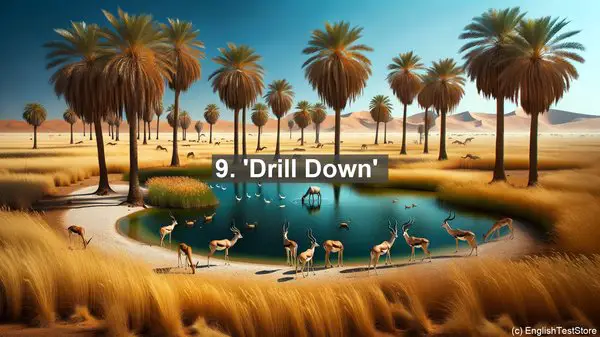Introduction: The Importance of English Idioms in the Petroleum Industry
As a petroleum engineer, you’ll often find yourself working in a global environment. English, being the lingua franca, plays a crucial role in your day-to-day communication. While you may have a good grasp of the language, understanding idioms is equally important. Idioms are expressions that have a figurative meaning, often different from their literal interpretation. They add depth and nuance to your conversations. In this lesson, we’ll explore the top 10 idioms that are commonly used in the petroleum industry.
1. ‘Oil the Wheels’
This idiom means to make things run smoothly or to facilitate a process. In the petroleum industry, where time is of the essence, ‘oiling the wheels’ is crucial. It refers to taking actions or making arrangements that ensure the smooth functioning of operations. For example, a project manager might say, ‘We need to oil the wheels of this drilling operation to meet the deadline.’
2. ‘Strike It Rich’
When you ‘strike it rich,’ it means you’ve found a valuable resource or achieved great success. In the petroleum industry, this idiom is often used to describe a significant oil or gas discovery. It signifies a breakthrough that can be a game-changer for a company or even an entire region. For instance, ‘The recent offshore exploration has the potential to strike it rich for our company.’
3. ‘In the Pipeline’
If something is ‘in the pipeline,’ it means it’s being planned or developed and will be available in the future. In the petroleum industry, this idiom is frequently used to talk about upcoming projects, technologies, or even potential oil reserves. For example, ‘We have some exciting innovations in the pipeline that can revolutionize offshore drilling.’
4. ‘On the Backburner’
When something is ‘on the backburner,’ it means it’s temporarily not being actively pursued or worked on. In the petroleum industry, where multiple projects and tasks are constantly in progress, some initiatives might be put ‘on the backburner’ due to resource constraints or changing priorities. For instance, ‘The plan to expand the refinery is on the backburner until the market conditions improve.’
5. ‘Off the Grid’
This idiom refers to being disconnected or isolated from the usual channels of communication or infrastructure. In the petroleum industry, where remote locations and offshore platforms are common, being ‘off the grid’ can be a reality. It implies being in a place with limited or no access to modern amenities. For example, ‘During the offshore drilling campaign, the team will be completely off the grid for several weeks.’
6. ‘All Hands on Deck’
When a situation requires ‘all hands on deck,’ it means everyone’s involvement and contribution are needed. In the petroleum industry, emergencies, critical operations, or major projects often demand the collective effort of the entire team. For instance, ‘We’ve encountered a well control issue. It’s time to get all hands on deck to resolve it.’
7. ‘Black Gold’
This idiom is a poetic way of referring to oil. Oil, being a valuable and sought-after resource, is often equated to ‘black gold.’ It highlights the economic significance and value of the petroleum industry. For example, ‘The country’s economy heavily relies on the production and export of black gold.’

8. ‘In Deep Water’
When someone is ‘in deep water,’ it means they’re in a difficult or challenging situation. In the petroleum industry, this idiom is commonly used to describe complex projects, regulatory issues, or even financial troubles. For instance, ‘The company’s recent investment in unconventional resources has put them in deep water due to the uncertain market conditions.’
9. ‘Drill Down’
In the petroleum industry, ‘drill down’ doesn’t just refer to the physical act of drilling. It’s often used metaphorically to describe a detailed analysis or investigation. For example, ‘Before making any investment decisions, we need to drill down into the data and evaluate the potential risks and rewards.’
10. ‘Fuel the Fire’
When you ‘fuel the fire,’ it means you’re adding to a conflict or making a situation worse. In the petroleum industry, where stakeholder interests, market dynamics, and geopolitical factors often intersect, certain actions or decisions can ‘fuel the fire’ and escalate tensions. For instance, ‘The proposed changes in the oil pricing policy have the potential to fuel the fire between the producing and consuming nations.’
Conclusion: Mastering Idioms for Effective Communication
English idioms are not just linguistic curiosities; they’re essential tools for effective communication. As a petroleum engineer, understanding and using idioms appropriately can help you build rapport, convey complex ideas, and navigate the nuances of the industry. So, make it a point to not just learn the technical jargon but also the idiomatic expressions. They’ll truly enrich your professional journey. That’s all for this lesson. Thank you for watching, and until next time, happy learning!

